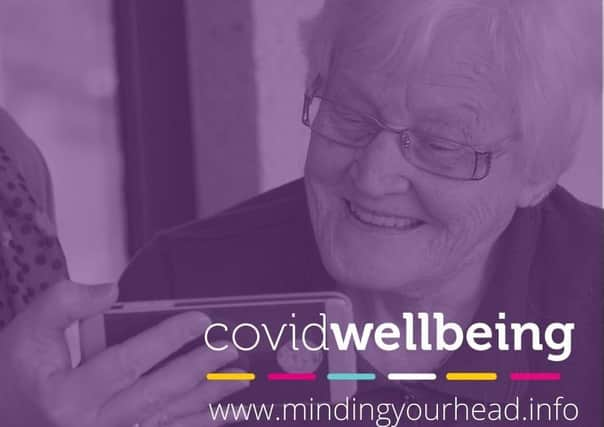Key to Covid-19 wellbeing in NI


Fear and anxiety about a strange new disease and what could happen can be overwhelming and cause negative emotions in both adults and children.
Public health actions, such as social distancing, have also increased feelings of isolation and loneliness and heightened stress and anxiety levels.
Advertisement
Advertisement
Change has happened fast and is tough for most people at the best of times, and many of us are worrying about what it all means for ourselves and for our loved ones; those of us already living with mental health problems are facing extra challenges too. With widespread social isolation, increasing unemployment and unprecedented levels of stress, without practical interventions we could be at the precipice of a mental health crisis.
A recent UK-wide study involving Queen’s University Belfast explored the psychological impact of lockdown and the Covid-19 pandemic on the public. The survey of over 2,500 individuals from all business sectors and communities, included 470 people from Northern Ireland. Of these, one third have been found to meet the criteria for anxiety (30%) and depression (33%), and one in five (20%) meet the criteria for Covid-19 related PTSD due to the current pandemic.
As a direct result of the emerging stresses and expected ongoing challenges, a new virtual wellbeing hub has been launched and Rural Support are a key partner in the project.
The Department for Communities and the Department of Health funded project, led by INSPIRE, has brought together 15 leading mental and wellbeing health charities and the Healthy Living Centre Alliance to focus on promoting mental health and wellbeing during and after the Covid-19 emergency.
Advertisement
Advertisement
Health Minister Robin Swann said: “This is a key part of the Covid Mental Health Response Plan I announced two weeks ago. I would encourage people to use this unique and impressive resource created as a direct response to the emotional impact Covid-19 is having on our society.”
Department for Communities Minister Deirdre Hargey said: “The CovidWellbeingNI partnership draws together an unprecedented wealth of expertise and support with one clear aim – to promote the positive mental health of people including those vulnerable people and communities who are struggling at this time.
“Existing inequalities have been amplified by the Covid-19 pandemic and it is important that information and support reaches as many people as possible.”
The CovidWellbeingNI partnership is calling on people to acknowledge how they are feeling and coping at this time; take positive action to look after their mental health and reach out for help and support.
Advertisement
Advertisement
The online wellbeing hub at www.mindingyourhead.info draws together information, self-help guides and ways to find support on a range of mental health and wellbeing issues.
Veronica Morris, Chief Executive of Rural Support said: “There will undoubtedly be a lasting impact of Covid19 for farmers and farm families, both in terms of business and mental wellness.
“Rural Support remains committed to building upon the foundations in place in both areas to best support our farmers and farming families.
“We are delighted to be involved in the CovidWellBeingNI partnership and will look forward to contributing to the practical support being made available through its online hub in the coming months and also in feeding into the wider discussions around a mental health strategy for the region ensuring that the needs of the farming community and its uniqueness are recognised and addressed.”
Advertisement
Advertisement
Rural Support helpline is 0800 138 1678. All calls are confidential, the helpline is available 9am-9pm, Monday to Friday (alternative support options available at all times).
The partner organisations are: Action Mental Health, Cause, Nexus, Aware, Mindwise, Cruse, Barnardo’s, Relate, Praxis, Rainbow, Age NI, Inspire, Addiction NI, Rural Support, Community Development & Health Network, Healthy Living Centre Alliance, Public Health Agency, Department for Communities and Department for Health.